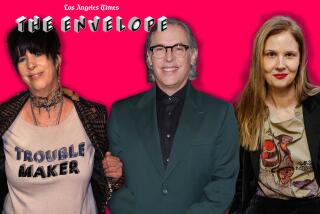TALES OF THE TAPE DECK : Audiocassettes Create Personal Sound Tracks for Our Lives
- Share via
It was the film “Out of Africa” that inspired my friend Judy Harris to comment that our lives would be more predictable if they had sound tracks. We would know by the music if danger, romance or miles of African coffee crops lay ahead.
Her observation started me thinking. We could each have themes, like Lara in “Dr. Zhivago,” that would herald our entrances (or Julie Christie’s). The music could get louder as we came closer, softer as we edged away. Violinists could be on standby to alert us to tragic events on the horizon. Military bands could huddle outside the house on the chance that the President might visit.
We are, after all, already creating scores for the present. With Sony Walkmans on our heads and tape decks in our radios, home stereos and cars, we daily set our lives to music. Only a battery, a switch or turn of the ignition key stands between us and the ideal background for what we’re thinking, doing or fantasizing.
Given the enormous range of radio fare in Los Angeles there’s often no need to customize. But what if KUSC is playing Bartok when I want to hear Brahms? Or if KZLA is hosting a Willie Nelson festival when I’m in the mood for Dolly Parton.
Enter the audio cassette.
There are millions of cassette players in the United States, and many of them are in cars. I still ride the freeways without a car phone, driver or manicurist. But I won’t ever again be without a cassette player.
Let’s talk control. Stuck in rush-hour traffic and 15 minutes late for an important appointment, there isn’t much I can do to get my car moving. But I rule the waves inside my car. As my own disc jockey, I decide what the next song--or birdcall--will be.
Windows up, music blaring out of speakers in the dashboard, doors, ceiling, air conditioner and ashtrays, we’re driving mobile stereos. You’re listening to Psychedelic Furs, I’m listening to Billy Joel and we both say we’re listening to Philip Glass.
Then again, why be passive? Colleague Susan Diamond thinks of her car as her own private concert hall as she plays choral tapes at full volume and sings right along. A mezzo when she first got her tape deck, today she’s a coloratura. Belting out the Mozart C-minor Mass at top volume, she considers herself absolutely indispensable backup to Kiri Te Kanawa. As she (Diamond, not Te Kanawa) said just the other day: “If I sang along anywhere else, dogs would run from me. And I couldn’t ask for a more discerning and appreciative audience.”
Music, as we all know, is only the start. Somebody’s buying all those talking books at the neighborhood car wash as well as at bookstores, and several book publishers have added audio titles to the hard and soft-bound ones. If you aren’t up to hearing Ian McKellen read D. H. Lawrence’s “Sons and Lovers” to you, there are replays of great radio shows.
Not everybody’s lining up for “In Search of Excellence” either. One friend drives to work listening to motivational tapes, while another is learning to speak Chinese. I spent the other morning driving in with Lauren Bacall (or, more accurately, her voice) reading Dorothy Parker’s “Big Blonde.” I was so caught up in the story that I sat in The Times’ garage for 10 minutes until it ended, then went in to work.
It’s no doubt only a matter of time until somebody starts selling talking background tapes. Triggered by the opening of a door or the starting of an engine, such tapes could feature a pleasant voice calling out something like “Hello, how was your day?” Next would be a long silent period, followed by nicely spaced variations of “uh, huh” and “then what happened.”
Meanwhile, pass me those “Success Without Distress” cassettes. Since I don’t know what’s coming next, I might as well learn a few things while I wait.
More to Read
The biggest entertainment stories
Get our big stories about Hollywood, film, television, music, arts, culture and more right in your inbox as soon as they publish.
You may occasionally receive promotional content from the Los Angeles Times.










